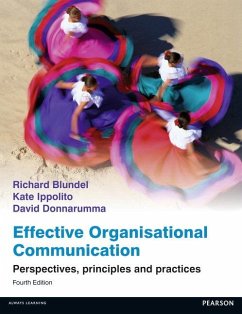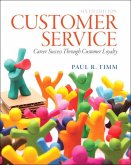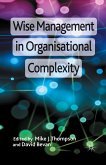Effective Organisational Communication gives students from all backgrounds the tools to communicate both within and between organisations of all kinds. Its two-part structure enables readers to explore important theoretical perspectives and key communication challenges, while also helping them to develop their own communication skills – such as listening, writing and speaking – in order to achieve specific aims and to engage with different audiences. This combination makes it the perfect resource for anyone who wants to improve their ability to work effectively with others. This heavily revised fourth edition reflects the rapidly changing world of organisational communication, with a special focus on social media and recent developments in advertising, PR and social marketing.
Product Description
Effective Organisational Communication gives students from all backgrounds the tools to communicate both within and between organisations of all kinds. Its two-part structure enables readers to explore important theoretical perspectives and key communication challenges, while also helping them to develop their own communication skills – such as listening, writing and speaking – in order to achieve specific aims and to engage with different audiences. This combination makes it the perfect resource for anyone who wants to improve their ability to work effectively with others.
This heavily revised fourth edition reflects the rapidly changing world of organisational communication, with a special focus on social media and recent developments in advertising, PR and social marketing.
Features to aid learning include:
Real-world case studies, from organisations of all kinds, that bring the topics alive.
‘Face to face’ case studies to connect concepts and issues with typical everyday communication challenges found at university and work.
Up to the minute coverage of international and inter-cultural communication and emerging technologies.
Web links providing a starting point for research and further study on key issues in each chapter.
Features + Benefits
Real-world case studies, from organisations of all kinds, that bring the topics alive.
‘Face to face’ case studies to connect concepts and issues with typical everyday communication challenges found at university and work.
Up to the minute coverage of international and inter-cultural communication and emerging technologies.
Web links providing a starting point for research and further study on key issues in each chapter.
Backcover
Effective Organisational Communication, 4th Edition
Blundel, Ippolito and Donnarumma
Effective Organisational Communication gives students from all backgrounds the tools to communicate both within and between organisations of all kinds. Its two-part structure enables readers to explore important theoretical perspectives and key communication challenges, while also helping them to develop their own communication skills – such as listening, writing and speaking – in order to achieve specific aims and to engage with different audiences. This combination makes it the perfect resource for anyone who wants to improve their ability to work effectively with others.
This heavily revised fourth edition reflects the rapidly changing world of organisational communication, with a special focus on social media and recent developments in advertising, PR and social marketing.
Features to aid learning include:
Real-world case studies, from organisations of all kinds, that bring the topics alive.
‘Face to face’ case studies to connect concepts and issues with typical everyday communication challenges found at university and work.
Up to the minute coverage of international and inter-cultural communication and emerging technologies.
Web links providing a starting point for research and further study on key issues in each chapter.
‘There is something refreshing about this text that derives from the breadth of the issues and perspectives addressed in the first half of the book, the worldview advanced through a willingness to engage with the complexity of organisations and communication, and the authors' rich yet succinct style of writing. They have managed to create a comprehensive text that addresses both the conceptual and the practical requirements of students, and even make topics like “meetings”, “email”, and “report writing” both instructive and engaging.’
Journal of Communication Management (2010)
1 Perspectives on communication
PART I PRINCIPLES OF COMMUNICATION
2 Breaking barriers: communication in practice
3 Using words: verbal communication
4 Making pictures: non-verbal communication
5 Developing arguments: persuasive communication
6 Establishing a dialogue: interactive communication
7 Making connections: organisational communication
PART II COMMUNICATION IN PRACTICE
8 Letters, e-mail and text messages
9 Reports, briefing papers and summaries
10 Advertisements, promotions, news releases and exhibitions
11 Interviews, questioning and listening
12 Presentations and audio-visual technologies
13 Meetings, teams and negotiations
14 Communication in perspective
Effective Organisational Communication gives students from all backgrounds the tools to communicate both within and between organisations of all kinds. Its two-part structure enables readers to explore important theoretical perspectives and key communication challenges, while also helping them to develop their own communication skills - such as listening, writing and speaking - in order to achieve specific aims and to engage with different audiences. This combination makes it the perfect resource for anyone who wants to improve their ability to work effectively with others. This heavily revised fourth edition reflects the rapidly changing world of organisational communication, with a special focus on social media and recent developments in advertising, PR and social marketing.
Hinweis: Dieser Artikel kann nur an eine deutsche Lieferadresse ausgeliefert werden.
Product Description
Effective Organisational Communication gives students from all backgrounds the tools to communicate both within and between organisations of all kinds. Its two-part structure enables readers to explore important theoretical perspectives and key communication challenges, while also helping them to develop their own communication skills – such as listening, writing and speaking – in order to achieve specific aims and to engage with different audiences. This combination makes it the perfect resource for anyone who wants to improve their ability to work effectively with others.
This heavily revised fourth edition reflects the rapidly changing world of organisational communication, with a special focus on social media and recent developments in advertising, PR and social marketing.
Features to aid learning include:
Real-world case studies, from organisations of all kinds, that bring the topics alive.
‘Face to face’ case studies to connect concepts and issues with typical everyday communication challenges found at university and work.
Up to the minute coverage of international and inter-cultural communication and emerging technologies.
Web links providing a starting point for research and further study on key issues in each chapter.
Features + Benefits
Real-world case studies, from organisations of all kinds, that bring the topics alive.
‘Face to face’ case studies to connect concepts and issues with typical everyday communication challenges found at university and work.
Up to the minute coverage of international and inter-cultural communication and emerging technologies.
Web links providing a starting point for research and further study on key issues in each chapter.
Backcover
Effective Organisational Communication, 4th Edition
Blundel, Ippolito and Donnarumma
Effective Organisational Communication gives students from all backgrounds the tools to communicate both within and between organisations of all kinds. Its two-part structure enables readers to explore important theoretical perspectives and key communication challenges, while also helping them to develop their own communication skills – such as listening, writing and speaking – in order to achieve specific aims and to engage with different audiences. This combination makes it the perfect resource for anyone who wants to improve their ability to work effectively with others.
This heavily revised fourth edition reflects the rapidly changing world of organisational communication, with a special focus on social media and recent developments in advertising, PR and social marketing.
Features to aid learning include:
Real-world case studies, from organisations of all kinds, that bring the topics alive.
‘Face to face’ case studies to connect concepts and issues with typical everyday communication challenges found at university and work.
Up to the minute coverage of international and inter-cultural communication and emerging technologies.
Web links providing a starting point for research and further study on key issues in each chapter.
‘There is something refreshing about this text that derives from the breadth of the issues and perspectives addressed in the first half of the book, the worldview advanced through a willingness to engage with the complexity of organisations and communication, and the authors' rich yet succinct style of writing. They have managed to create a comprehensive text that addresses both the conceptual and the practical requirements of students, and even make topics like “meetings”, “email”, and “report writing” both instructive and engaging.’
Journal of Communication Management (2010)
1 Perspectives on communication
PART I PRINCIPLES OF COMMUNICATION
2 Breaking barriers: communication in practice
3 Using words: verbal communication
4 Making pictures: non-verbal communication
5 Developing arguments: persuasive communication
6 Establishing a dialogue: interactive communication
7 Making connections: organisational communication
PART II COMMUNICATION IN PRACTICE
8 Letters, e-mail and text messages
9 Reports, briefing papers and summaries
10 Advertisements, promotions, news releases and exhibitions
11 Interviews, questioning and listening
12 Presentations and audio-visual technologies
13 Meetings, teams and negotiations
14 Communication in perspective
Effective Organisational Communication gives students from all backgrounds the tools to communicate both within and between organisations of all kinds. Its two-part structure enables readers to explore important theoretical perspectives and key communication challenges, while also helping them to develop their own communication skills - such as listening, writing and speaking - in order to achieve specific aims and to engage with different audiences. This combination makes it the perfect resource for anyone who wants to improve their ability to work effectively with others. This heavily revised fourth edition reflects the rapidly changing world of organisational communication, with a special focus on social media and recent developments in advertising, PR and social marketing.
Hinweis: Dieser Artikel kann nur an eine deutsche Lieferadresse ausgeliefert werden.








